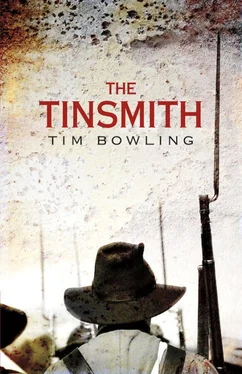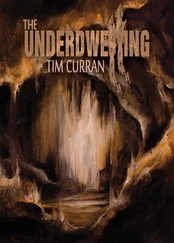Reluctantly, Greaver started for his tent to get a crowbar. Perhaps he could even pry Tomkins out of hiding with it, get him to do the work.
But the little man said, “That’s all right. It won’t be necessary.” He spoke once again in whispers that Greaver couldn’t catch. The officers, stone-faced, finally nodded.
The older one said, “This Rebel officer, how did he come to you?”
Ah, of course. Greaver had known there was something suspicious about that tall soldier. Eagerly, he said, “A very tall soldier, not in my employ, you understand, brought him to me. I didn’t trust him at all. The body was still warm.”
The air snapped around the three listeners.
“What time was this?” the little man said, taking a notebook out of his pocket.
“Let’s see, let’s see.” Greaver pulled at his lower lip. “Early in the afternoon of the day after the battle. That is, yesterday afternoon, gentlemen. Yes, just when the rain started. I remember the rain.”
The little man lifted his pencil off the notebook. “This soldier who brought you the body? Describe him.”
Greaver wracked his brain. The soldier had been extremely tall, his uniform ripped. What else? His eyes bulged. He was threatening, unbalanced. But already the embalmer’s image of the man had faded, as if the rain had washed it away. He sighed heavily.
“He was tall, well built. His uniform was ripped. I didn’t trust him, gentlemen.”
“You didn’t?” the older officer said. “Why not?”
Oh, dear, Greaver thought, this is not going at all well. These men will not like to hear how my business is conducted. “Yes, you see, I offer payment for the bodies brought to me. But he did not want money.” The embalmer scrambled to defend his practice. “It is, ah, a small expense for the privilege of preserving our soldiers and sending them home to their families.”
The younger officer wrinkled his nose. A touch of red came into his fair cheeks. “There appears to be no end to your noble deeds on behalf of the Republic.”
Greaver was not bothered; he had grown used to people’s distaste for his profession. But he had expected the army to appreciate the comfort he provided; it was no small thing for a soldier to head into battle knowing that, if the worst befell him, he would not lie in a mass grave away from home. Greaver stood a little taller. In the near distance, he saw the photographer tinkering with his tripod again. Yes, a portrait taken in the field, if not too expensive, might prove very useful for business.
With dignity, he said, “If that is all, gentlemen, I have much work waiting for me.”
The younger officer suddenly pulled his sabre out from the sheath at his side and placed the tip only inches from Greaver’s nose.
“You filthy scavenger! You goddamned greedy sonofabitch!”
“Lieutenant,” the older officer said calmly but did not move.
The otterlike man chuckled. He stepped forward as the younger officer lowered his weapon.
“He didn’t want money, you said. What did he want?”
Greaver, swallowing rapidly and trembling, could not hear any birdsong. A sort of low moan drifted over the fields. He slowly opened his eyes, which he’d closed desperately on the snake-head of the sabre’s tip.
The bearded man stood there, grinning broadly, his stance wide and steady beside the little man. “A very tall soldier, did you say? In a ripped uniform?”
The little man nodded. “Do you know something about this, Alex? You’ve been out here since the battle.”
“Aye, Alan, but my head’s been mostly under cloth, you see, and the world’s a tad topsy-turvy then.”
He spoke rapidly, gave a forced laugh. Eyes wide open, Greaver gazed at him. Why, he did know something. But what was there to know? It was all very confusing, and Greaver hated to be on shifting ground. He waited. The photographer pulled at the rough ends of his flowing beard. Finally, he shrugged.
“I’ve seen a lot of soldiers, tall and short, living and dead. I canna remember one that’s special for any reason that might interest you in your work, Alan.”
The older officer grunted. “I believe we’ve wasted enough time here, Pinkerton.”
“Perhaps.” The little man’s eyes narrowed. He looked slowly around him, his gaze settling on Greaver’s coffins. Then, as loudly as he had yet spoken, he said, “Did you remove the papers from the body?”
Greaver blinked. His lips parted. All the shadows on the ground rushed toward his feet.
After ten seconds, the photographer burst into laughter.
“Nice try, Alan. I believe it would have worked too, if the man wasna telling the truth.”
The little man did not smile. “And I believe you’re wanting fresh plates, Alex? I believe you’re wanting the use of the telegraph?”
The photographer sighed. “Yes, but you canna blame me for my good nature now, can you?”
“Time and place. I’m sure you’ve heard the expression?”
Then he and the two officers turned and strode away, the little man moving his feet almost as rapidly as he moved his eyes.
“Well, now, doctor,” the photographer said once the others had gone and the sound of horse hooves broke the silence. “A curious business?”
Sweat blurred Greaver’s lenses once more, but he did not remove his glasses. Everything confused him so much more than life and death. Cold skin, sunken eyes, no smudges on a hand mirror, no sound in chest or wrist. Incision, raised veins and arteries, drain, inject. Into coffin. Name, address. Collect fee. Why should a man attempt to see clearly except in the execution of his talents? Greaver studied the blurred image before him. A curious business? Did he mean embalming, or the missing body? And taking photographs of dead soldiers—that seemed the opposite of providing comfort to the bereaved. Why should this man, this photographer, be free of suspicion? Ah, only because he did not do the necessary, unpleasant work of actually preserving the dead in their material form.
Uncannily, the photographer picked up the train of Greaver’s thoughts.
“You canna expect others to understand, doctor. When you work with the dead, in such a place as this, you might be accepted, but not loved.” He leaned back, made a square over one eye with two fingers of each hand. “The army survives on intrigue. They might even be in the business of making it happen. Never mind. I was wondering, doctor, if you’d mind posing for a photographic study?”
Greaver brightened, Already, the pounding of the horse hooves had faded. He unlooped his glasses and puffed on the lenses. Wouldn’t Tomkins be impressed! A carte de visite, in the field, preserving a corpse! It was a surprising and marvellous world, full of opportunity, once the shadows sped away from your feet and you could listen to the lovely flow of liquid through a syringe, hour after hour. After wiping his lenses clean, Greaver looped them over his ears, and the world dazzled, all of it zinc-lined, at his service.
He licked his upper lip with the tip of his tongue, gracefully cleared his throat. “Perhaps, sir, we could come to some sort of a bargain.”
The photographer held his grin still for several seconds. Then he laughed so loud that Greaver was certain the dead still out in the fields all sat up to enjoy a final earthly joke.
September 21, near Sharpsburg, Maryland
Three days after his fight with Orlett, when the worst of the shock had worn off, when he was able to blot out the images of the blood-coloured fringe of hair around the overseer’s leering face and drown the desperate lie flung from that foul mouth, John returned to himself. He lay in a square, sagging tent crowded with groaning, gasping men on their way to death, judging by the stench of it that pressed against his eyes and lips, a stench as bad as what he remembered hogs giving off as they squealed before the knife.
Читать дальше












